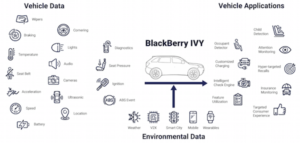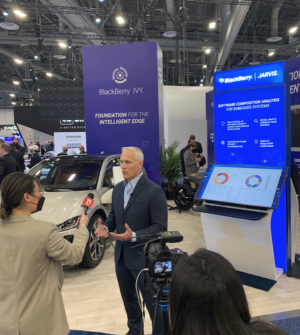
By Ed Pierce, Contributing Editor
April 4, 2022
Data is one of the most powerful tools that companies can use in 2022. In order to learn more about the future of data and EVs, we sat down with Jeff Davis, senior director of IVY ecosystems business development at BlackBerry to discuss the newest product they’re co-developing with AWS. Davis walked us through IVY, an intelligent middleware system designed to alleviate the problem for OEMs and developers to pull data from EVs across their entire fleet. Here’s what we learned:
What are the challenges of electrification for fleet managers?
Davis identified the high cost of switching from cheaper internal combustion engine (ICE) vehicles to more expensive electric vehicles as the first challenge. The second problem he brought up was the fact that fleet managers will have to switch from an ecosystem they know well to one that is completely different. Instead of being able to rely on fixed maintenance cycles and finely tuned marginal costs, fleet managers will have to begin working in an entirely new landscape that can be intimidating.
The last challenge that Davis mentioned was the introduction of new issues that fleet managers aren’t used to dealing with. With EVs, managers will have to look for ways to optimize charging and power capacity as well as offset the added energy costs. But while electrification brings with it several unique challenges, Davis noted that it also brings a few benefits as well. EVs have a reduced maintenance cost compared to ICE vehicles. In addition to a lower maintenance cost, they also have a lower total cost of ownership due to their greater lifespan.
How does the BlackBerry solution benefit fleets?
Davis stated that as fleet managers navigate the new ecosystem of electric vehicles, they have to deal with the different architecture between various makes and models. However, with this challenge comes an opportunity as well. The more we develop EVs, the more developed the software within these vehicles becomes. Similar to the way a BlackBerry phone became a multi-use tool with one operating system, electric vehicles will also soon be able to operate with a single ECU. We’re getting closer and closer to a single operating system within the vehicle every day, which will allow us to process massive amounts of data.
 Davis noted that EVs contain numerous sensors that are constantly pulling data from around the vehicle. While there isn’t currently a good way to pull all that data into one place and analyze it for insights, this is where IVY presents a solution. With IVY built into each of the EVs in the fleet, application developers can run the same applications on all cars even if they’re different makes or models. They can then compare the data between the cars, giving them insight into things like driver performance, battery charge times, and other data that can improve marginal profit.
Davis noted that EVs contain numerous sensors that are constantly pulling data from around the vehicle. While there isn’t currently a good way to pull all that data into one place and analyze it for insights, this is where IVY presents a solution. With IVY built into each of the EVs in the fleet, application developers can run the same applications on all cars even if they’re different makes or models. They can then compare the data between the cars, giving them insight into things like driver performance, battery charge times, and other data that can improve marginal profit.
IVY is a scalable, cloud-based software platform that will streamline computing costs and improve operations with data visibility. The software is compatible with most operating systems and cloud platforms, making it easy for fleet managers to access and use to extract insights. It also ensures data privacy to safely enhance the in-vehicle customer experience.
How are you working with OEMs and FMCs to benefit fleets?
Davis stated that while developing the platform of IVY to go into the vehicle and work within the cloud, BlackBerry is simultaneously building an ecosystem that goes with that platform. BlackBerry is working with Tier 1 companies like Verizon, Telus, HERE, Electra, and Car lQ that are part of that ecosystem. Car IQ’s integration with IVY creates a “digital fingerprint” for the vehicle so that it can securely connect to banks, card payment networks and in-vehicle marketplaces.
BlackBerry is also working with companies that use machine learning like AWS. By building machine learning into those synthetic sensors, you can receive even deeper insights into the data. Davis mentioned that as BlackBerry approaches fleet providers and FMCs, they want to partner with companies that can help them provide richer data.
 At CES, BlackBerry announced a proof of concept (POC) with PATEO, a leading Internet of Vehicles (IoV) technology service & product provider in China. The company has even partnered with finance companies like Solifi and Zoura that are creating systems to allow people to finance based off of the data from their EVs. Even companies like Geico can benefit from this data in monitoring driver behavior to keep insurance costs down.
At CES, BlackBerry announced a proof of concept (POC) with PATEO, a leading Internet of Vehicles (IoV) technology service & product provider in China. The company has even partnered with finance companies like Solifi and Zoura that are creating systems to allow people to finance based off of the data from their EVs. Even companies like Geico can benefit from this data in monitoring driver behavior to keep insurance costs down.
Is this the first effort to bring all of the collective data together?
Davis noted that while companies like Geotab extract EV data using an OBD-II port, they have yet to do anything embedded in the vehicle itself. An OBD-II port is single function, whereas a platform like IVY can be used to pull data and insights through embedded engineering. It can also work for different cars, making it easier to do at scale for an entire fleet. BlackBerry is the first third party company building a solution that can be sold to multiple OEMs and charged based off of use.
How is your solution different from what’s currently available?
According to Davis, the multi-use of the data off the IVY system is the first thing that differentiates IVY. While most companies are currently using OBD-II ports to extract data through an iPad, IVY will give them access to data coming directly from the vehicle that multiple companies can gain different types of insights from. This data is even more accurate than that taken through an OBD-II port and the platform can be used across models and sold to multiple different OEMs.
What actions can fleet managers take right now?
Davis said that fleet managers could be making demands to OEMs for access to more data rich insights, which would help them do their job better. They can start looking at what kind of insights they need and communicating these needs to OEMs while also using their strength as buyers as leverage.




